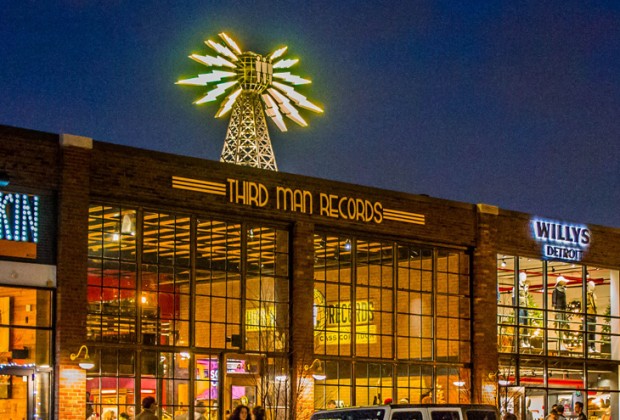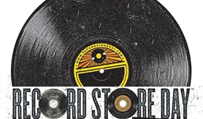Singer, songwriter, musician and producer Jack White grew up in the Mexicantown neighborhood of Southwest Detroit, MI. Although White founded Third Man Records in 2001 in Detroit, the first brick-and-mortar space broke ground in Nashville, TN in 2009. In 2015, Third Man Records partnered with Detroit lifestyle brand Shinola to purchase a building to house a 4,000-square-foot Detroit retail space.
By Kimberly Mack
Launching in the Cass Corridor on Black Friday 2015, co-founder Ben Blackwell describes opening day as “pretty hectic”—with customers camped out overnight in the rain, and lines wrapped around the block on the morning of the event.
According to Blackwell, himself a native of Detroit and a member of the city’s garage band, The Dirtbombs, the Cass Corridor location makes perfect sense: “With the [now defunct] Gold Dollar just around the corner, I witnessed a lot of life-changing performances there when I was still a teenager. I also played on the stage there about half-a-dozen times. And it’s where the first-ever White Stripes performances took place. And it’s where the deal was struck to release the first White Stripes single. And Jack went to high school in the neighborhood and The White Stripes played a bunch of shows at the Masonic Temple just further up the block. There’s no shortage of good memories from that neighborhood.”
While it’s difficult to tell the extent of the progress the city of Detroit has made in rebuilding since its July 2013 bankruptcy, there are signs of economic growth in Downtown, and it’s clear that its natives are willing to rally in support of local businesses. In 2016, the 10,000-square-foot Third Man Vinyl Pressing Plant will debut—the first new Detroit-based pressing plant since the family-owned and operated Archer Record Pressing opened in 1965. The plant (located behind the retail store) will run eight new record presses manufactured by the German company Newbilt. Blackwell shares, “They have not cranked out any records before. Prior to these presses I’m unaware of new presses that were available to purchase to manufacture vinyl records since the 1980s.”
The plant will serve Third Man Records releases, as well as those of local Detroit artists. Its goal is to both fill an important need (presses like Archer are currently backed up and unable to take on new customers) and make a positive economic impact on the local community by providing manufacturing jobs and making it easier for indie bands to produce their own records. “I’d hope to give a focus to smaller independent folks. When we were making records 15 years ago, the fact that major labels weren’t tying up pressing plants was welcome. That helps foster the culture and foster the appeal of the medium. But if that isn’t available for folks moving forward, they’re going to want to just really be into downloads or something,” Blackwell laughs.
“One of the main reasons that we liked vinyl in the ‘90s when The White Stripes first came out,” he continues, “or bands and labels that we were doing back then, was that it was more accessible than CDs. It was more affordable. You could do a 7-inch single cheaper than you could do a CD. That’s appealing.” And for those who are simply curious about how vinyl records are made, a window in the retail shop will allow shoppers to see the manufacturing process in real time: “That’s not something that you can go anywhere else and see. Just walk in off the street and see some records being pressed in that manner. That’s pretty important.”
As a nod to Detroit’s rich musical history, at the launch Third Man Records released a set of nine 7-inch vinyl reissues from the early days of Berry Gordy’s Tamla Records. There are also plans in the works for reissues and releases by other Detroit artists. A Detroit aesthetic reverberates in the design “with the wall-sized portraits of the MC5, The White Stripes and The Gories on the wall….all in performance in the Cass Corridor. That’s not something we would’ve done in Nashville.”
Other Third Man offerings include a vinyl version of Quentin Tarantino and Ennio Morricone’s The Hateful Eight soundtrack that was released on Dec. 18 (“We’re fans of Tarantino and I believe he’s a fan of ours. He wanted to work with us, so we made it happen!”), and Nashville country singer Margo Price & The Pricetags’ debut solo album, Midwest Farmer’s Daughter, arrives in March 2016.
So can we anticipate a chain of Third Man Records retail stores across the United States? “Right now,” he reasons, “Nashville and Detroit feels good. I don’t want to claim that we’ll never go anywhere else. But these are the two cities in the world that make the most sense for us. Maybe some other city might make sense in the future. Maybe not, but it’s not like building Chipotles or something like that. It is boutiquey. It’s not something that would make sense in every city in America.”
For more information, visit thirdmanrecords.com/about/detroit-storefront












